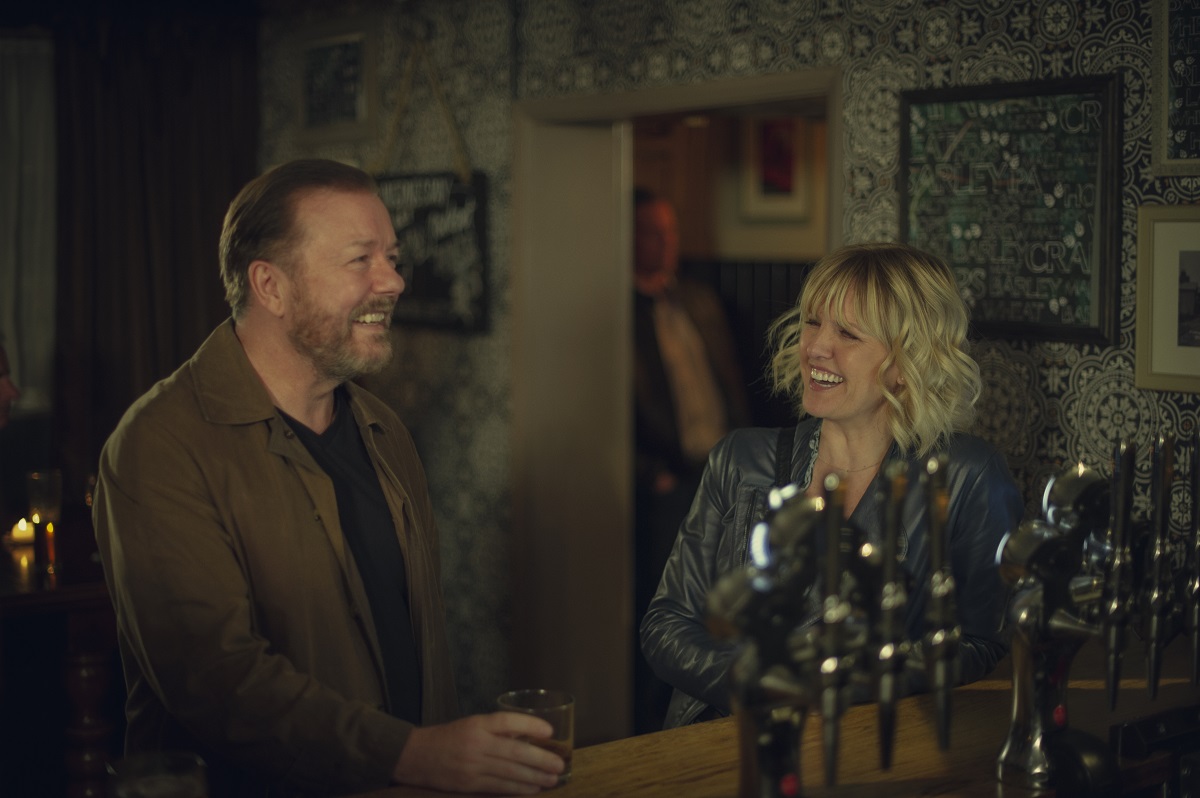Like the series itself, and existence in general one supposes, the news about the second season of Netflix’s “After Life” is a bit of a mixed bag. On one hand, its strengths remain the same: a solid cast giving equally solid performances, top-lined by a career-best turn from Ricky Gervais; a willingness to let tart and even bitter punchlines rub alongside things much more fragile; ongoing acknowledgment of the complexity and messiness of grief; a complete disinterest in saintly suffering. On the other, its flaws also linger: flat, disinterested staging and cinematography; some weird cognitive dissonance that arises when the blend of tart, bitter, and heartfelt curdles; the odd moment of cruelty the show itself doesn’t seem to recognize; an overabundance of sad guitar songs. (Gervais, as before, also writes and directs all episodes.) Yet there’s a third piece here, one which makes this second outing more successful, or at least more effective, than the first: timing.
You see, there’s an element of the story here that might be damning under normal circumstances, which is that Tony (Gervais) is pretty stuck. If the first season of “After Life” was all about the character’s journey, the second is about his inability to climb out from under his grief. That’s not to say he’s totally stagnant. Tony’s putting in the very hard work of being something close to okay, one small moment of kindness or attempt at patience at a time. While he doesn’t often backslide, he also doesn’t make much progress, and the writing (intentionally) and direction (perhaps intentionally, perhaps not, but regardless, it’s bad) reflect this state of hard-fought stagnation. That should be bad, both for the character and the show; Tony’s expressed desire is to live out “Groundhog Day.” Yet it’s the perfect moment for a show in which someone is working very, very hard to just be okay, and who would absolutely love to get to that place and stay there. There’s no better time for a story of this exact nature to arrive. He’s existing, somewhat functionally, and that requires a lot—a lot—of hard work.
The work takes the form of his routine. Feed and walk the dog. Maybe have breakfast with Roxy (Roisin Conaty), an unexpected friend who he has finally, finally started calling a sex worker instead of a prostitute; maybe banter with the oddball postman (Joe Wilkinson). Go to work for the local paper, alongside his boss/brother-in-law Matt (Tom Basden), idealistic young writer Sandy (Mandeep Dhillon), and Lenny, a patient, plodding photographer (Tony Way), among others; maybe go out on assignment, to write up one of the oddballs in their sleepy village. Sit on a bench in a cemetery and chat to Anne (the great Penelope Wilton), also grieving. Visit his father (David Bradley), who’s suffering from dementia in an assisted living facility, and talk with his nurse Emma (Ashley Jensen), with whom he shares an uneasy and tenuous bond. Buy wine, get drunk, watch videos of his dead wife Lisa (Kerry Godliman). That was the routine in the first season as well, but Tony has mostly stopped wounding people and sowing chaos; instead, he’s primed to witness the wounds those in his orbit try to conceal, and to extend something like compassion when he can. Repeat daily.

Thus the repetitiveness of “After Life” can be called a feature, not a bug, though some of the pieces work better than others. Tony and Lenny’s assignments feel like excuses for Gervais to shovel in jokes and/or opinions on issues and culture, like holdovers from the first season picked at random from the discard pile. They are, at best, kind of funny or thematically rich—a visit to the village’s oldest woman, who got a present from the queen, is particularly effective, as is a chat with a particularly effusive cat owner. Most frequently, they break whatever spell the series has managed to cast, absurdities that can’t quite fit into the show’s tonal balance. At worst, however, they’re cruel in a way the show itself seems unaware of—it’s not Tony being callous, hurtful, or impatient, but “After Life” itself. A visit to a local resident who “identifies as an eight-year-old girl” is particularly repugnant, as “After Life” pats itself on the back for its compassion and irreverence while parroting some seriously damaging ideas about transgender issues. (Just a thought: perhaps working with other writers outside your realm of experience could help one avoid spreading ignorant and harmful stereotypes and misinformation?)
It’s a shame, because cut all or most of those sessions and a lot of the first season’s biggest flaws disappear. Cut poor Paul Kaye as television’s worst mental health professional and the situation improves even more—these, too, feel like an element the series has outgrown. Suddenly that balance between the acidic and the sweet improves, allowing the ridiculous and even repellent to fit inside the gentle, wounded world Tony inhabits. This balance is perhaps best achieved when Tony interacts with Wilkinson’s postman, whose total lack of social grace and refusal to acknowledge boundaries is met with frustration and indignation as well as patience and empathy. When the series finds its mark, as it does in a scene involving a well-timed postcard, it’s possible to see what “After Life” could be, if only Gervais would get out of its own way.
Still, there’s more to appreciate here than before, if only because there’s no better time to recognize how difficult it can be to simply exist and be decent when the world feels inhospitable or cruel. And if nothing else, Gervais the actor has built on the work of that first season in a way that feels honest, fragile, and even surprising. If a third season is on the horizon—and the ending, distressing and complex in a way the happy floaty music selection belies, certainly warrants one—one hopes that both the world and Tony will be ready to leave “Groundhog Day” behind.
Whole season screened for review. Premieres Friday, 4/24.












